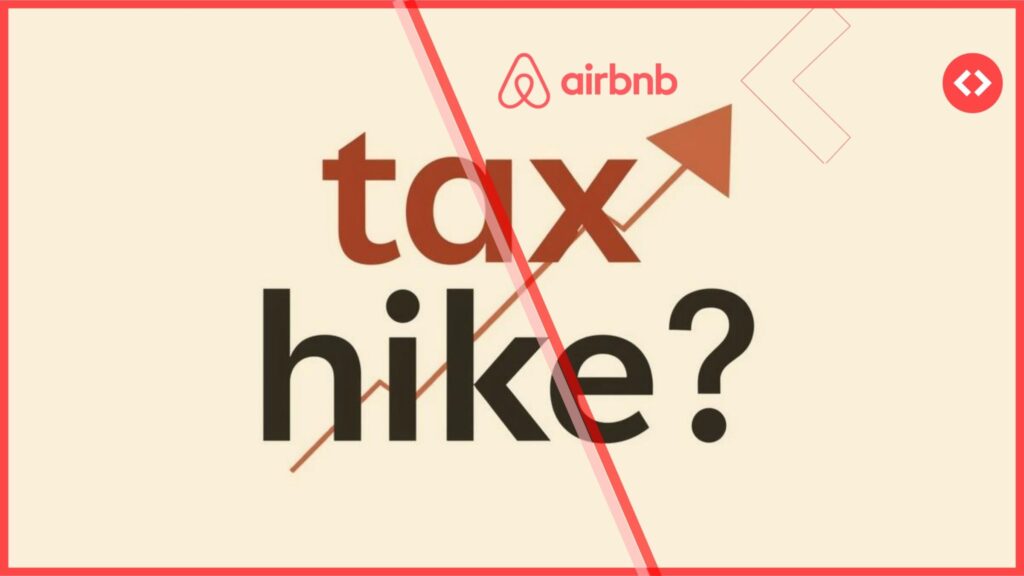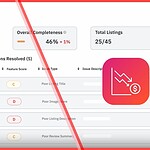Airbnb fee changes are sparking confusion among U.S. vacation rental operators. With Airbnb’s switch to a 15.5% host-only commission, many are asking a fair question:
“If I have to raise my rates to cover this new fee, won’t I also owe more in taxes?”
The short answer: not on your profit or income tax.
The longer answer: some small local or gross-receipts taxes may tick up — but for most hosts, this change is tax-neutral.
1. Why You’ll Need to Adjust Prices (and by How Much)
Before October 27 2025, Airbnb used a split-fee model:
- ~3% paid by the host, and
- 14–16% paid by the guest.
With the new 15.5% host-only fee, Airbnb removes the guest service fee and deducts the full 15.5% from the host payout.
Here’s what that means in numbers:
| Scenario | Guest Total (What They Pay) | Base Rate (Visible to Host/PMS) | Airbnb Fee (from Host Payout) | Host Payout | Host Effect |
|---|---|---|---|---|---|
| Old model (3% host fee) | $230 (includes guest fee) | $200 | $6 | $194 | Baseline |
| New model (no markup) | $200 | $200 | $31 | $169 | −12.9% |
| New model (adjusted) | $230 | $229 | $35.50 | $193.50 | ≈ Same |
If you do nothing, your payout per booking drops about 13%.
To stay revenue-neutral, you (or your PMS) need to increase your Airbnb markup so the guest-facing price rises proportionally.
2. Understanding the PMS Markup Math
Most PMS systems already apply a small markup on Airbnb rates to offset the old 3% host fee.
Previously, that markup was ~3.06%.
To maintain the same payout after the 15.5% fee, the markup on Airbnb listings should now be ~18.34%.
| Comparison | Markup vs. Base Rate | Change in Guest-Facing Total | Explanation |
|---|---|---|---|
| Old markup | +3.06% | — | Offset Airbnb’s 3% host fee; guest separately paid Airbnb’s 14–16% service fee. |
| New markup | +18.34% | ≈ 0% (total paid stays similar) | The markup now includes Airbnb’s former guest fee. Total guest spend stays roughly the same; only the distribution changes. |
So, while the markup setting rises from 3.06 → 18.34 percent, the actual increase in guest-facing price is about 14.8%, not 18%.
That’s because the new markup replaces the old one, not adds on top of it.
✅ In short:
Your PMS’s “Airbnb markup” should change from 3.06% to 18.34%.
That raises the guest-visible price by roughly 15%, ensuring your host payout remains identical after the 15.5% commission.
3. Why It Feels Like a Tax Hike
When your gross receipts (the top-line revenue Airbnb reports before fees) rise by about 15%, it looks like you’re earning more.
That’s what triggers the concern: “If my 1099-K shows higher revenue, won’t my taxes go up?”
It’s a fair question — but here’s what really happens under U.S. tax law.
4. Federal and State Income Taxes Are Based on Profit, Not Revenue
According to IRS Topic 414 and Publication 527, vacation rental owners and managers are taxed on net income, not gross receipts.
Your taxable income is calculated as:
Revenue – Expenses = Taxable Income
Airbnb’s commission — whether 3% or 15.5% — is an ordinary and necessary business expense that’s fully deductible under IRS rules.
So:
- Before, you deducted 3%.
- Now, you’ll deduct 15.5%.
- Net income (and therefore tax) stays the same.
Even though your 1099-K shows a higher number, that fee deduction ensures you’re only taxed on what you actually keep.
✅ No double taxation. Airbnb pays tax on its own 15.5% revenue share; you pay on your 84.5%.
✅ No higher income tax. Your deduction rises in proportion to your reported gross.
✅ No change to your effective rate. You still pay tax on profit, not on the total booking value.
5. Where Taxes Might Rise Slightly
While federal and state income taxes remain unchanged, certain state and city taxes are based on gross receipts (not profit).
If your nightly rates — and thus your total booking revenue — go up, those specific taxes can increase marginally.
Examples of States with Gross Receipts Taxes
| State | Tax Type | Rate / Threshold |
|---|---|---|
| Nevada | Commerce Tax | 0.05–0.3% on gross receipts > $4 M |
| Ohio | Commercial Activity Tax (CAT) | 0.26% over $1 M |
| Washington | Business & Occupation (B&O) Tax | 0.47–1.5% (no threshold) |
| Delaware | Gross Receipts Tax | 0.0945–1.99% by sector |
| Oregon | Corporate Activity Tax (CAT) | 0.57% on commercial activity > $1 M |
If your management company operates in these states and your gross receipts rise from adjusting nightly rates, you may owe slightly more under these taxes — but your profit-based taxes remain unchanged.
6. Local Business or License Taxes on Gross Receipts
Some U.S. cities also levy business or license taxes tied to total revenue, such as:
- Los Angeles, CA: ~0.4–0.5% of gross receipts
- San Francisco, CA: 0.16–0.65% above $2.25 M
- Philadelphia, PA: 0.141% on gross + 5.71% on net income
These minor taxes can inch up slightly as gross receipts rise, but typically represent well under 1% of total revenue.
7. Lodging & Occupancy Taxes — Pass-Through Only
Airbnb automatically collects and remits lodging and occupancy taxes on behalf of hosts in most jurisdictions.
Those are calculated on the guest’s payment amount, not your payout.
If your nightly rates go up to offset the 15.5% fee, Airbnb simply collects slightly more occupancy tax from guests — that money never passes through your profit.
8. Action Steps for Property Managers
- Update your PMS Airbnb markup:
- Old: ~3.06%
- New: ~18.34%
This yields a ~14.8% higher listed rate, maintaining net payouts.
- Adjust fixed fees manually (cleaning, pet, extra guest): multiply each by 1.1834 to preserve your net earnings after Airbnb’s 15.5% cut.
- Continue deducting Airbnb’s commission as a business expense on Schedule C or E.
- Check state/local thresholds if you operate in GRT or license-fee jurisdictions (Nevada, Washington, San Francisco, etc.).
- Communicate with owners: Make clear that price increases are operational adjustments, not new taxes.
✅ Bottom Line
| Tax Type | Based On | Change After 15.5% Fee? | Impact |
|---|---|---|---|
| Federal Income Tax | Net income | No change | Airbnb fee deductible |
| State Income Tax | Net income | No change | Mirrors federal rules |
| Gross Receipts Tax | Total revenue | Possible ↑ | State-specific impact |
| Local License Tax | Gross receipts | Possible ↑ | Minor in big cities |
| Lodging / Occupancy Tax | Guest payment | Slight ↑ (pass-through) | Paid by guest, not host |
The Takeaway
Airbnb’s move to a 15.5% host-only commission changes how fees appear on paper — but not how much tax you owe.
If you raise your Airbnb markup from 3.06% to 18.34%, your guest price rises by about 14.8%, and your net payout stays the same.
Your income taxes don’t go up — because the commission is deductible.
Only a handful of states or cities with gross-receipts-based taxes might see a small uptick.
Bottom line: The numbers rise on paper — but your profits (and income taxes) stay flat.
What changes is the markup, not your tax burden.
Thibault Masson is a leading expert in vacation rental revenue management and dynamic pricing strategies. As Head of Product Marketing at PriceLabs and founder of Rental Scale-Up, Thibault empowers hosts and property managers with actionable insights and data-driven solutions. With over a decade managing luxury rentals in Bali and St. Barths, he is a sought-after industry speaker and prolific content creator, making complex topics simple for global audiences.








